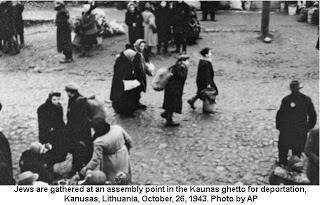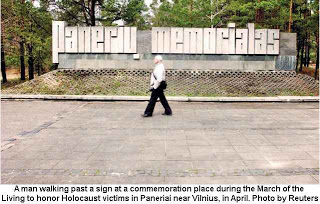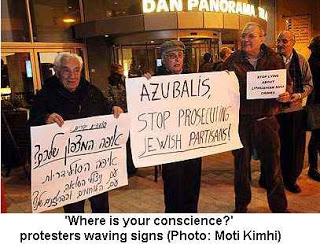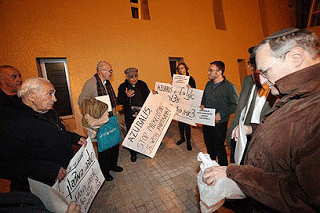That the Lithuanian government should commemorate the memory of its quisling Prime Minister is not surprising. That the same anti-Semites who laud the Lithuanian Waffen SS survivors are also pro-Zionist is also not surprising. But that Israel’s Foreign Minister, the arch-racist Avigdor Lieberman, should hosts a ministerial welcome to Lithuania’s Foreign Minister, a man who tried to prevent the restoration of stolen property to its Jewish owners, should shock even a few Zionists. But truth to tell it will hardly make an impression on Zionism’s hypocritical defenders in places like Harry’s Place.
Barely a dozen demonstrators, some of whom were themselves holocaust survivors, turned out to demonstrate outside Tel Aviv’s Dan Panorama hotel. What is interesting is the reaction to the article on Ynet. The majority of them actually attack the critics of Lithuanian support for the Waffen SS. Take young Daniel, whose piece is entitled ‘YNET’S BLATANT LEFTIST BIAS’ . The unrelenting persecution of the Palestinians has led to many Israelis actually identifying with the Nazis, who also had a problem with those whose territory they occupied. Daniel writes in the Comments:
‘Latvia is a westernized state, and despite its mercilessness toward the Jews during WWII, it modern-day support for Israel’s right to exist (support coming mainly from its political right) makes it among Israel’s best friends in the world today. Yet you focus exclusively on Latvia’s past sins, making no mention at all of its modern pro-Israel actions.
You also conveniently omit the Soviets’ persecution of Jews in Latvia and the rest of Eastern Europe.
Meanwhile, in another article about Turkey, you emphasize how nice the Ottomans were to Jews in the past and down-play modern Turkish antisemitism. You implicitly blame the break-down of Israeli-Turkish ties on Israel’s attacking the Marmara without mentioning that it was sponsored by Turkish extremist group or that its passengers attacked Israeli soldiers. You also completely ignore Turkish ties to Iran and Hamas, and instead of identifying the Islamist ideology of Turkey’s anti-Israel political elements, you describe them as “conservative”, conflating them with the largely pro-western, pro-Israel conservatives of Christian countries (e.g. Latvia). Daniel , Formelry Israel (03.05.12)’
You see, it doesn’t matter if they mercilessly persecuted their Jews. The fact is that Lithuania is ‘among Israel’s best friends in the world today.’ It’s hard to argue with this ‘logic’. After all most Nazis, beginning with the first head of the Gestapo’s Jewish desk, one Baron von Mildenstein and later Eichmann, were also supporters of Zionism. Nonetheless I posted a short reply (we’ll see if it gets posted):
‘How predictable. Latvia (in fact Lithuania!) is a pro-Zionist western state. Therefore the little matter of the 95% of its Jews who were murdered can be forgot. Maybe there’s a connection between honouring the most vile of the vile – the collaborators with the Nazi occupiers and their support for Israel.
And why not attack the Netherlands too. Yes 70% of its Jews died but the ignoramus who wrote this probably doesn’t know that the only General Strike against deportations in the whole of Europe was in Amsterdam. Admittedly it was the workers, not the businessmen who forget the dead when money is involved and then the lie that the Soviet Union killed 3 times as many as Hitler – this is the typical argument of those who wish to rehabilitate the Nazi state.
What goes around comes around. You support racism against palestinians and you start to see anti-Jewish racism in a new light. And this is the Jewish State. Suffice to say that Yad Vashem, the State Holocaust Mockery Museum welcomed Azubalis. No doubt they had a lot to talk about.
Tony Greenstein
Holocaust survivors rally against Lithuanian FM
Protesters claim Audronius Azubalis, who is visiting Israel, made anti-Semitic remarks. ‘Lithuania trying to belittle memory of Holocaust ,’ says Director of the Simon Wiesenthal Center Dr. Efraim Zuroff
Gilad Morag, 03.05.12, 22:50 / Israel News
Some 15 people, including Holocaust survivors, protested Monday evening against the Lithuanian foreign minister, who is visiting Israel to attend a commercial business conference at Tel Aviv’s Dan Panorama hotel.’
The protesters, who held signs in Hebrew and English reading “where is your conscience? Where is your solidarity with the Holocaust survivors?”, claimed Foreign Minister Audronius Azubalis had made anti-Semitic comments in the past, and that the Lithuanian government has made attempts to “belittle the memory of the Holocaust.”
Director of the Simon Wiesenthal Center Dr. Efraim Zuroff said that Azubalis is “a guest of honor for Israeli groups doing business here. However, this is a man who has made anti-Semitic remarks and opposed a bill that would have helped Lithuanian Jews get their stolen property returned.
According to Zuroff, “Lithuania’s government has been fighting a battle to turn the Holocaust into another tragedy among many. Their aim is to place Nazis and Communists on an equal footing. That is to say they are comparing between those who build the Auschwitz and those who liberated it. This angers us and that’s why we’re protesting,” he exclaimed.
Attorney Yossef Melamed, an 87-year-old Holocaust survivor who attended the protest told Ynet: “I was 17 during the Holocaust. After the war, me and a few of my friends compiled a list of 3,000 Lithuanians who we believe cooperated with the Nazis.
המפגינים עזבו עוד לפני שהשר עבר במקום (צילום: מוטי קמחי)
Melamed said he later discovered that “some names on the list are considered to be national heroes in Lithuania,” adding that he was accused of making false allegations and even interrogated by police officers who came to his house and told him that he might be sued.
“The list we wrote is proven, and I don’t mind going to trial, as long as it is here in Israel and I don’t have to go back to Lithuania,” he noted.
Marcelle Juliet Saul Sheiman, among the conference organizers, said in response: “The event was organized as part of the celebrations for the 20 year anniversary of Lithuania-Israel relations.
“The protesters have every right to demonstrate, but our view is that we are moving on – not forgetting the Holocaust, but encouraging close relations between the two nations.”
The Lithuanian Embassy was not available for comment.
HOLOCAUST SURVIVORS “DEVASTATED”
“Lithuania has magnificent real heroes of 1941: the inspirational people who saved an innocent neighbor from the LAF and Provisional Government’s reign of genocide, starting with the war’s first week. They are that year’s heroes of history who should be honored. May their families live to see streets and squares named for them.”
Lithuania reinstates event to honor Nazi collaborator
Lithuanian government is financing the reburial of the “prime minister” of the 1941 Nazi puppet government as well as four days of events honoring him.By Ofer Aderet | May 16, 2012
The Lithuanian Parliament published on Wednesday an updated schedule of events in honor of the repatriation to Lithuania of the remains of Juozas Ambrazevičius, the “prime minister” of the 1941 Nazi puppet government.
One of the scheduled events, a conference earlier slated for Vytautas Magnus University in Kowno, was moved to “venue to be announced” after the university’s rector decided to call off the event, following a Haaretz report, explaining he wished to “save the honor” of the institution and criticizing the nation’s parliament.
Nevertheless, two professors from the same university are among the speakers at the new event honoring Ambrazevičius.
In a controversial move, causing anguish among Holocaust survivors, Lithuania’s Jewish community and the Association of Lithuanian Jews in Israel, the remains of Ambrazevicius, who died almost 40 years ago in the United States, will be reinterred from Connecticut to the Church of the Resurrection in Kaunas. En route, he will be honored in the Lithuanian capital, Vilnius, in a ceremony slated for Thursday.
The Lithuanian government is financing the transatlantic reburial and four days of events honoring the Nazi collaborator. Wednesday’s parliamentary press release confirmed that the reburial mass will be conducted by the archbishop metropolitan, Sigitas Tamkevičius, who recently published effusive praise for him.
The documents signed by Ambrazevičius in his capacity as “prime minister” of the 1941 “provisional government” include the June 27, 1941 statement calling for all means against the Jews but asking that executions not be public; the June 30, 1941 order for a concentration camp for Jews to be set up; and the July 7, 1941 order for all the Jews of Kaunas to be forcibly relocated into a ghetto within four weeks. They were all revealed by the defending history website.
In a letter to parliament, university’s rector says political events should not take place on university grounds; it is still unclear if the rest of festivities will take place as scheduled.
By Ofer Aderet | May.15, 2012 | 9:58 PM
The Lithuanian University in Kaunas on Tuesday decided to cancel a commemorative conference planned for the “prime minister” of Lithuania’s 1941 Nazi puppet government.
In a controversial move, causing anguish among Holocaust survivors, Lithuania’s Jewish community and the Association of Lithuanian Jews in Israel, the remains of Juozas Brazaitis Ambrazevicius, who died almost 40 years ago in the United States, will be reinterred from Connecticut to the Church of the Resurrection in Kaunas. En route, he will be honored in the Lithuanian capital, Vilnius, in a ceremony slated for Thursday.
A memorial conference in the Vytautas Magnus University of Kaunas was originally scheduled for Saturday.
Following a Haaretz report, the university’s rector and his deputy had decided to call off the event, explaining they wish to “save the honor” of the institution. In a letter addressed to Lithuanian parliament, Rector Prof. Zigmas Lydeka and Vice Rector Prof. Aukse Balcytiene wrote that political and memorial events should take place in the parliament, and not on university grounds.
Lithuanian European Parliament member Prof. Leonidas Donskis, who led the battle against the decision, said that “the final position of the university sends a clear message: such an event would have been a disgrace.”
Donskis, a former dean at the university, added: “we reject any attempt to glorify individuals and groups who symbolize the suffering and the catastrophe of Lithuanian Jews.”
Donskis also said that since the idea came up, he “couldn’t believe that this would be possible at Vytautas Magnus University,” an institution he described as “the most liberal university in Lithuania and in the Baltic region.”
The conference was just one of many events planned for this week in Lithuania in Ambrazevicius’ honor, whose government was involved in the persecution and murder of Jews in Lithuania in 1941. Jewish organizations were outraged by the decision to pay respects to Ambrazevicius, and it was also condemned by the Simon Wiesenthal Center.
Glorifying a Nazi collaborator in Lithuania
To the chagrin of Jewish groups, Lithuania commemorates the head of it’s 1941 puppet regime.
By Ofer Aderet | May.15, 2012 | 3:33 AM | 4
In a controversial move causing anguish among Holocaust survivors, Lithuania’s Jewish community and the Association of Lithuanian Jews in Israel, the “prime minister” of Lithuania’s 1941 Nazi puppet government will be glorified, reinterred with full honors and subject of a commemorative conference at Vytautas Magnus University this week.
The remains of Juozas Brazaitis (Ambrazevicius ), who died in the United States in 1974, will be re-interred from Putnam, Connecticut, to the Church of the Resurrection in Kaunas. En route, he will be honored in the Lithuanian capital, Vilnius, in a ceremony slated for May 17.
The Simon Wiesenthal Center’s chief Nazi-hunter, Holocaust historian Dr. Efraim Zuroff, described the move as “an absolute outrage.”
Adv. Joseph A. Melamed, chairman of the Association of Lithuanian Jews in Israel, told Haaretz: “One should resist this action. The government of Ambrazevicius was in charge of the murder of the Jews of Lithuania.”
The Lithuanian embassy in Israel, however, said Ambrazevicius “was indeed controversial,” but “it’s hard to judge the period in which he was active.”
Ambrazevicius, born in 1903, was a Lithuanian literary historian and politician with nationalistic views. Best known for being prime minister of the Nazi-puppet “provisional government” from the day it was formed on June 23, 1941 to its dismantling by Nazi overlords on August 5 that year.
His government was formed by the Lithuanian Activist Front (LAF ), “whose members and allies unleashed murder, mutilation, rape and pillage against dozens of Jewish communities in Lithuania in the days before the Germans arrived and set up their new administration,” according to Dovid Katz, a Vilnius-based Yiddish studies scholar and human rights activist currently living in Lithuania and the editor of DefendingHistory.com, which is dedicated to publications on public affairs, anti-Semitism and Holocaust issues.
“The government openly called upon the local population to attack Lithuanian Jews. This incitement to murder was a significant factor in the violence unleashed by Lithuanians against Jews in more than 40 places, even before the arrival of the German troops, and in the horrific wave of mass murder unleashed with massive local help after the country was occupied,” added Zuroff.
The mayor of Kaunas, Andrius Kupcinskas, who headed the committee that approved the move, was quoted in the local media: “Every state leader must be given certain state honors. The provisional government of Lithuania was trying to return statehood to Lithuania. Historians may assess this variously, but his attempts were noble.”
However, historical documents proved a deep connection between the government and the Nazi regime. The name of the Ambrazevicius appears atop the June 30, 1941 order for setting up a concentration camp for Jews, and the July 7, 1941 order to establish the Kovno (Kaunas ) ghetto for incarceration of the city’s Jewish residents – as revealed by the website defendinghistory.com, which provides the original documents.
Moreover, the government ministers signed a telegram of greeting to Hitler in the summer of 1941, which is also quoted on the website: “After the liberating hurricane, which has overtaken Lithuania, the representatives of the free Lithuanian community are sending You, the Fuehrer of the German people, most profound and sincere gratitude for the liberation from the all-destroying and murderous occupation of the Jews and communists, and for saving the Lithuanian people from outrage, extermination, wanton mass torments and murders, and express their hope that Your Genius will give the Lithuanians the chance to take part in the campaign that aims at the annihilation of Judaism, Bolshevism and plutocracy, protection of the human being, freedom, protection of the culture of western Europe and the establishment of a new order in Europe.”
When the government learned about the unusually cruel public torture of Jewish civilians in Kaunas, they adopted a recommendation concerning the venue for mass executions: “Though it is necessary to implement all means against the Jews because of their communist activities and their inflicting harm upon the German army, it is recommended that the Partisans and individual citizens should avoid the public executions of Jews.”
The program of the festivities (on May 17, 18, 19 and 20 ) in Lithuania will include a May 19 memorial conference at Vytautas Magnus University in Kaunas. “We sincerely hope that professors, students and local and international friends and admirers of Vytautas Magnus University, one of the finest in the Baltics, will make their voices heard respectfully asking for the cancellation of this misconceived event,” wrote Katz in his journal.
Milan Chersonski, the long-time editor of Jerusalem of Lithuania, a quadrilingual (English-Lithuanian-Russian-Yiddish ) newspaper of the Jewish community of Lithuania, and previously director of the Yiddish Folk Theater of Lithuania, wrote in an essay published in defendinghistory.com that “Lithuania is the only country in Europe where street names in major cities honor Nazi collaborators. There is a street in Kaunas and a lecture hall in the city’s Vytautas Magnus University named after Ambrazevicius.”
Around 95 percent of Lithuanian Jewry perished in the Holocaust – the highest percentage in Europe – due to the massive participation and collaboration of locals.
Last month Lithuania received a failing grade from the Simon Wiesenthal Center for its activity against Nazi criminals. “It didn’t bother to reply to the survey we distributed on the subject all over the world. Since 2006 not a single Nazi criminal has been tried there,” said Zuroff.
Referring to the present affair, he added: “This is an absolute outrage which exposes the hypocrisy of the current Lithuanian government, which repeatedly claims that it takes the subject of Holocaust commemoration seriously … To honor Ambrazevicius is to besmirch the memory of the victims of the Holocaust in Lithuania and make a mockery of Lithuania’s programs of Holocaust commemoration and education.”
On the other hand, Violeta Popova, the deputy Lithuanian ambassador to Israel, claimed that “It is hard to judge that period from today’s perspective,” adding that Ambrazevicius was persecuted both by the Nazis and by the Soviets, because of his struggle for independence. “More than once he tried to convince Germany to stop persecuting Lithuanian Jews,” she said. “After the German occupation he joined the anti-Nazi movement, was persecuted by the Gestapo, changed his name and was exiled to the United States.”
A document she presented shows that in 1975 the U.S. Immigration Service exonerated him of involvement in pro-Nazi and anti-Jewish activity. But according to Zuroff, “At the time the Americans didn’t have the data that clearly point to his connection to the Nazis and to anti-Jewish violence.”
The Lithuanian embassy presented another side of the picture. “There isn’t a single government in Europe that is doing what we do for the Jews,” says Popova. “It’s very important to us to preserve our Lithuanian Jewish heritage and to remember those who were killed in the Holocaust.”
In that context, she says, there have been dozens of projects for studying the Holocaust, a law was passed to compensate its victims, and money was allocated to restore Jewish sites in the country.



